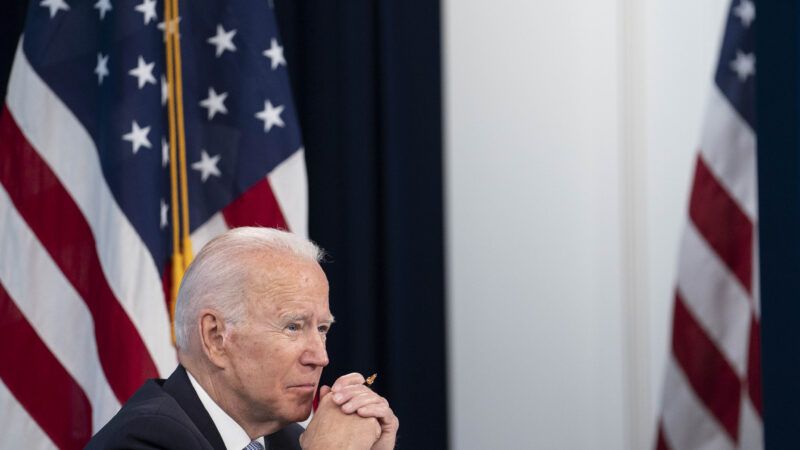The Stealthy Economic Radicalism of Biden's Boring Presidency
Even the president's most entrenched political opposition cannot seem to find much to engage or enrage.

In the half a year that Joe Biden has been president, it has become something approaching conventional wisdom that he is a boring politician, running a boring presidency that is focused on enacting boring policies. Even his most entrenched political opposition cannot seem to find much to engage or enrage.
A recent Atlantic article on the downturn in conservative publishing, for example, noted that it has been hard for right of center authors and editors to turn Biden into the sort of villain who moves books, and that his "relative dullness is his superpower." Similarly, a report in Axios this week declared that the "boring news cycle" had led to a downturn for partisan media. Opposition outlets usually see a boost when a new president from the opposing party settles in the White House; this time, that hadn't happened. "While the Biden administration has seen plenty of debate over policy," the Axios report said, "economics and a crisis at the border, personality-based controversy has largely been absent."
Biden, in this narrative, is boring. And unless you are a wonk engaged in the minutiae of policy debate—how big is the output gap? Is the federal unemployment insurance bonus slowing the recovery? How much should we worry about inflation?—his policies are boring too.
This is fair enough, in some ways: Compared to Donald Trump, who specialized in intemperate outbursts, bizarre personal fixations, and Twitter provocations perfectly calibrated to drive his opponents mad, Biden's presidential persona is a cloud of calm. But those pesky policy debates are, in fact, worth engaging, even if Biden has soft-sold their likely consequences.
Consider Biden's big social-spending proposal, the American Families Plan, which promises a vast expansion of welfare spending that would put a majority of Americans on federal benefits—even when the economy is strong and the country is not in crisis. In a new working paper, the Hoover Institution's John F. Cogan and Daniel Heil find that the plan would add more than 6 million households, and more than 21 million Americans, to federal entitlement rolls—pushing the percentage of non-elderly American households receiving such entitlements past the 50 percent mark. Outside of possibly the pandemic years of 2020 and 2021 for which data is not yet available, they write, "this would be the first time in U.S. history that a majority of working age households are federal entitlement recipients." Biden wants to make a majority of prime age American households (even more) dependent on federal largesse, a sea-change in the relationship between individuals and the federal government. But I suppose that's boring in comparison to some crazy presidential tweet.
Then there are Biden's tax plans which, even according to center-left analysts, would ultimately raise taxes on 60 percent of taxpayers — and possibly an even larger percentage of the middle class. This is in spite of Biden's repeated claims that no one making less than $400,000 a year will pay more in taxes. In theory, Biden keeps this pledge by raising taxes on corporations, not individuals. But even left-leaning economists agree that individuals eventually end up bearing some of that burden…but ah, sorry, I'm being boring again.
Meanwhile, Biden's budget, if enacted in full with both the American Families Plan and the American Jobs Plan (his infrastructure proposal), would result in fewer jobs and a smaller economy after a decade, according to an estimate from the Tax Foundation.
The point is that these sorts of plans, with their tax rate adjustments and opaque spending buckets and bureaucratic implementation schemes might seem boring—but if enacted, they will have serious consequences for both individual livelihoods and the broader economy in the relatively near future.
The putative boringness of Biden's presidency has at least one real upside: Under the last few presidents, and Trump in particular, too many Americans have become raging political obsessives, viewing far too much of life through the lens of national politics. During the pandemic, as states shut down economic activities and a considerable amount of social life moved into highly politicized online spaces, that tendency only increased. America, or at least Extremely Online America, got the Facebook and Twitter version of cabin fever.
Thankfully, as the pandemic ebbs and states reopen, that seems to be subsiding at least a little, which is one reason why partisan media has hit a slump. There is something genuinely healthy about turning away from vicious online political squabbling as a central mode of living.
At the same time, that turn should not become a vehicle for a highly partisan, highly ideological overhaul of federal power. There is a stealth economic radicalism hidden by Biden's boring nature, and his very boringness has become a kind of strategic tool. Part of the problem, of course, is that too many Republicans, still entranced by the dying embers of Trump's presidency, are not all that interested in Biden's economic agenda. There is a deep failure on the part of the broader GOP, both its voters and its elected representatives, to engage productively on these issues. The GOP is engaged on the culture war, but not on the vast economic transformation that Biden is proposing.
If anything, Republicans are actively looking for ways to endorse parts of Biden's agenda. Under Trump, Republicans endorsed precursors to many of the policies that Biden is now proposing. To the extent that Biden's economic agenda is meeting serious opposition it is from centrist economists long associated with the Democratic party. But wonky intraparty arguments about macroeconomic policy are, I suppose, the definition of boring politics.
Boring, however, is not the same as irrelevant or unimportant or inconsequential. On the contrary, under the current president, the opposite is true. You may not be interested in Joe Biden. But the president, through his policies, is very much interested in you.


Show Comments (249)